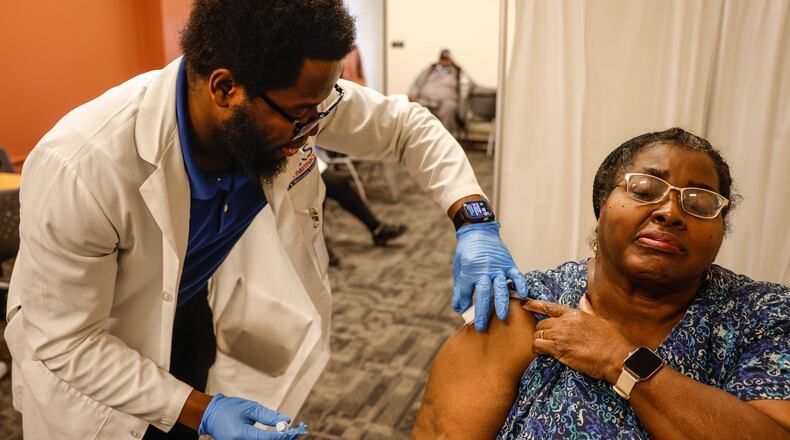People who are getting a COVID-19 vaccine or booster can get a flu shot at the same time, said Lisa Henderson, vice president of health initiatives at the Greater Dayton Area Hospital Association.
“Cases in our region of COVID-19 have been increasing. Hospitalizations are increasing, and we don’t want to see a case where we have a really bad flu season and COVID surge,” Henderson said. “We want people to get protected against both.”
So far this season, 39 people in Ohio have been hospitalized with the flu, including 14 new hospitalizations reported for the week ending Nov. 27, which is the latest report available from Ohio Department of Health. The new statewide numbers are reported every Friday.
No pediatric flu-related deaths have been reported so far. Adult flu-related deaths are not tracked at the state level.
Past flu seasons don’t predict what will happen in the next flu season, but generally Ohio flu cases and hospitalizations start to climb in mid- to late December.
Only 122 flu hospitalizations were reported in Ohio last season, which was unusually low. In other recent years, annual flu season hospitalizations have ranged from about 8,600 to 17,400.
Health officials urge flu vaccines for everyone 6 months and older to lower people’s personal risk, to protect the people around them, and to help preserve hospital capacity since COVID-19 is also present.
Flu shots are available at many pharmacies, public health clinics, primary care practices, workplaces and pop-up clinics. You can also search for a flu vaccine near your home at vaccines.gov/find-vaccines/.
A Clark County Health Department spokesman said appointments at its immunization clinic are available at 937-390-5600, with regular hours 8 a.m. to 5 p.m. Monday, Wednesday and Fridays.
People at higher risk of serious flu complications include young children; pregnant people; people with certain chronic health conditions like asthma, diabetes or heart and lung disease; and people 65 years and older, according to the Centers for Disease Control and Prevention.
If people at higher risk from flu get flu symptoms, they could benefit from taking antiviral drugs early after symptoms start and should call their health care provider to ask about flu antivirals.
The CDC also advises that vaccination is important for health care workers, and other people who live with or care for people at higher risk to keep from spreading flu to them. This is especially true for people who work in long-term care facilities, which are home to many of the people most vulnerable to flu.
Along with vaccines, other prevention steps include avoiding close contact with sick people, covering coughs and sneezes, and frequent hand washing. The CDC recommends people recovering from flu stay home for at least 24 hours after any fever is gone, unless leaving to get medical care or another necessity.
Flu symptoms include fever, cough, sore throat, runny or stuffy nose, body aches, headache, chills and fatigue. Some people also may have vomiting and diarrhea.
About the Author

